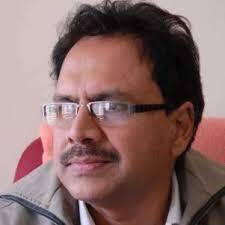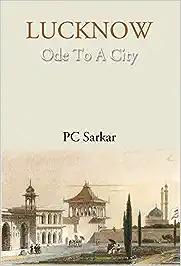
ABOUT THE AUTHOR:- Dr. PC Sarkar holds a Ph.D in organic chemistry and is presently working as a Principal Scientist with the Indian Council of Agricultural Research, Govt. of India. He did his schooling from St Francis’ College, Lucknow, followed by college education from Lucknow Christian College and Lucknow University. He retained his passion for the Nawabi and colonial heritage of Lucknow, even though the call for a livelihood took him far from his beloved city at a relatively young age. In addition to a specialized book on chemistry and several research publications in national and international journals pertaining to his profession, Dr Sarkar has to his credit, more than 50 articles on Lucknow, which appeared in the Heritage Page of the Lucknow Tribune during the years: 2013-14. His first book, Lucknow: Buildings, Begums and The British, published in 2015, continues to be widely popular, for detailing hitherto unknown aspects of Lucknow, generally not discussed or written about. n an interview with our group publication, Book Ghar, Dr. Sarkar, shares his thoughts on his books pertaining to Awadh and its culture.
Book Ghar : Among all your published books on heritage and culture what you think is the most interesting topic and why?
Dr. Sarkar : Lucknow – Ode To A City
This second book of mine (2021) contains a wealth of deeply researched information and analysis of the lost architecture of Lucknow which has never been described or even attempted to be described in any previous book on Lucknow so far.
Book Ghar : What drives you to write another book on Lucknow?
Dr. Sarkar : I still feel that there is a stagnation as regards the descriptive analysis of Lucknow by various authors. I attempt to correct this by addressing new topics and describing facets generally not known or known but ignored. After all, original research is tedious and time consuming; it is much better to describe few rulers and some of their creations again and again, rather than write something new. I also try to bust myths and silly stories which do the rounds of tourist circuits, thereby bringing a bad reputation to the city’s past and even present.
Book Ghar : Do our history books, too, need to adapt to changing times and be shorter?
Dr. Sarkar : It depends on the target audience. History books for course curricula should be simple and specific. But books on heritage, of which history is just one part, cannot be simple or short as they have to address the topic from various angles. Also the target audience of such books may not be college students, but readers who are deeply knowledgeable themselves and are seeking to augment their knowledge even further.
Book Ghar : Which Lucknow monument in your opinion has the best architectural design?
Dr. Sarkar : The Rumi Darwaza, which is truly the signature monument of the city.
Book Ghar : Does heritage conservation takes into account the revenue generated by a monument, it’s maintenance cost?
Dr. Sarkar : It is difficult to bring a monument’s commercial importance with its architectural merit. Every monument is not the Taj Mahal, which has international fame. In general, if a monument is used for commercial gain or activity, e.g. as a heritage hotel, or even as a museum, there is always the risk of misuse, additional and unwanted construction activity and it’s “modernization” by way of electrical and civil requirements. Striking a balance between commercial considerations and aesthetics, heritage value and architectural merit is very difficult, indeed impossible.
Book Ghar : What’s your advise to budding authors who want to write a historical account?
Dr. Sarkar : There is a wealth of information out there. Do not do cut paste. Make a concerted effort and bring out something new. Also verify a statement several times before stating it.
Book Ghar : Other than monuments, what’s the lasting legacy of the Nawabs?
Dr. Sarkar : The entire cultural landscape of Lucknow is due to the Nawabi rule, be it cuisine, dance and music (fine arts), dress, language, etiquette, handicrafts, and a laid back lifestyle, if somewhat decadent, for which Lucknow is so famous.
Book Ghar : What do you’ve to say to those who say that too much has been written about the Nawabs and we need to look beyond?
Dr. Sarkar : I don’t blame them. Most of the books are repetitive and lack novelty. If books with novelty are written, I am sure such criticisms would not occur.
Book Ghar : Tell us something about your upcoming book on lost heritage of Awadh
Dr. Sarkar : True to my inclinations, my forthcoming book, LUCKNOW CHRONICLES – Memories, Musings, Myths contains further detailing of the Nawabi rule and it’s aftermath. It also describes the horrendous battles which the city went through during 1857 – 58 and much more.
All rights reserved with Book Ghar : A venture of Pisces Books

